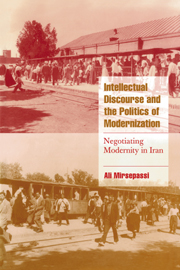Book contents
- Frontmatter
- Contents
- Acknowledgments
- Introduction: modernity and “culture”
- 1 Western narratives of modernity
- 2 Reconciling with the West's Other
- 3 The crisis of secularism and the rise of political Islam
- 4 Islam as a modernizing ideology: Al-e Ahmad and Shari'ati
- 5 German intellectuals and the culture of modernity
- 6 The tragedy of the Iranian Left
- 7 Modernities of our time
- Notes
- Bibliography
- Index
Introduction: modernity and “culture”
Published online by Cambridge University Press: 06 October 2009
- Frontmatter
- Contents
- Acknowledgments
- Introduction: modernity and “culture”
- 1 Western narratives of modernity
- 2 Reconciling with the West's Other
- 3 The crisis of secularism and the rise of political Islam
- 4 Islam as a modernizing ideology: Al-e Ahmad and Shari'ati
- 5 German intellectuals and the culture of modernity
- 6 The tragedy of the Iranian Left
- 7 Modernities of our time
- Notes
- Bibliography
- Index
Summary
Many here [in the West] and some in Iran are waiting for and hoping for the moment when secularization will at last come back to the fore and reveal the good, old type of revolution we have always known. I wonder how far they will be taken along this strange, unique road, in which they seek, against the stubbornness of their destiny, against everything they have been for centuries, “something quite different.”
Michel FoucaultIdentifying a tension
Michel Foucault welcomed the Iranian Revolution and its “Islamic spirit” as an intellectually exciting revolt against the rigidity of modern-secular imagination. He sarcastically asked, “What is it about what happened in Iran that a whole lot of people, on the left and on the right, find somewhat irritating?” Answering this question requires a serious exploration into the genealogy of the Western narrative of modernity and its dichotomizing representation of non-Western cultures and societies. Is modernity a totalizing (dominating and exclusionary) ideology primarily, and inescapably, grounded in European cultural and moral experience, and therefore incapable of understanding other cultures as anything other than as its inferior “other”? Or, is modernity a mode of social and cultural experience of the present that is open to all forms of contemporary experiences and possibilities? The dilemma here is how to reconcile the tension between modernity's promise of openness and inclusive qualities (the Enlightenment moral promise and the modernist radical vision) and the blatant Eurocentric narrative of modernization that forecloses the possibility of real “local” experiences and of their contribution in the realization of modernity. This study lays out a story of Iranian modernity, intending to explore this troubled, and troubling, situation.
- Type
- Chapter
- Information
- Intellectual Discourse and the Politics of ModernizationNegotiating Modernity in Iran, pp. 1 - 14Publisher: Cambridge University PressPrint publication year: 2000
- 1
- Cited by



